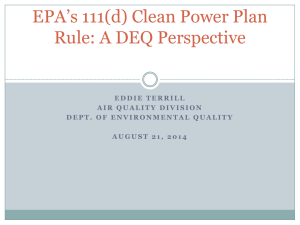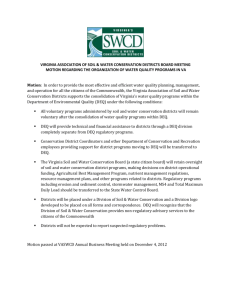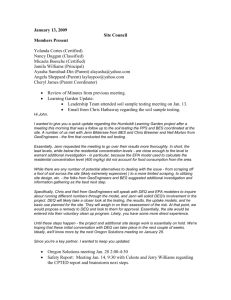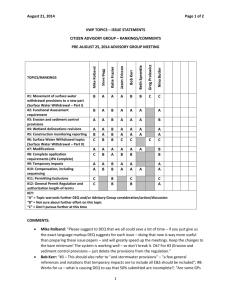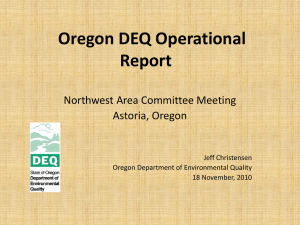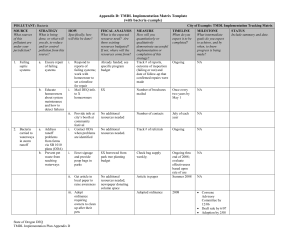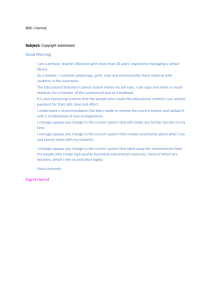environmental quality - Louisiana Association of Business and Industry
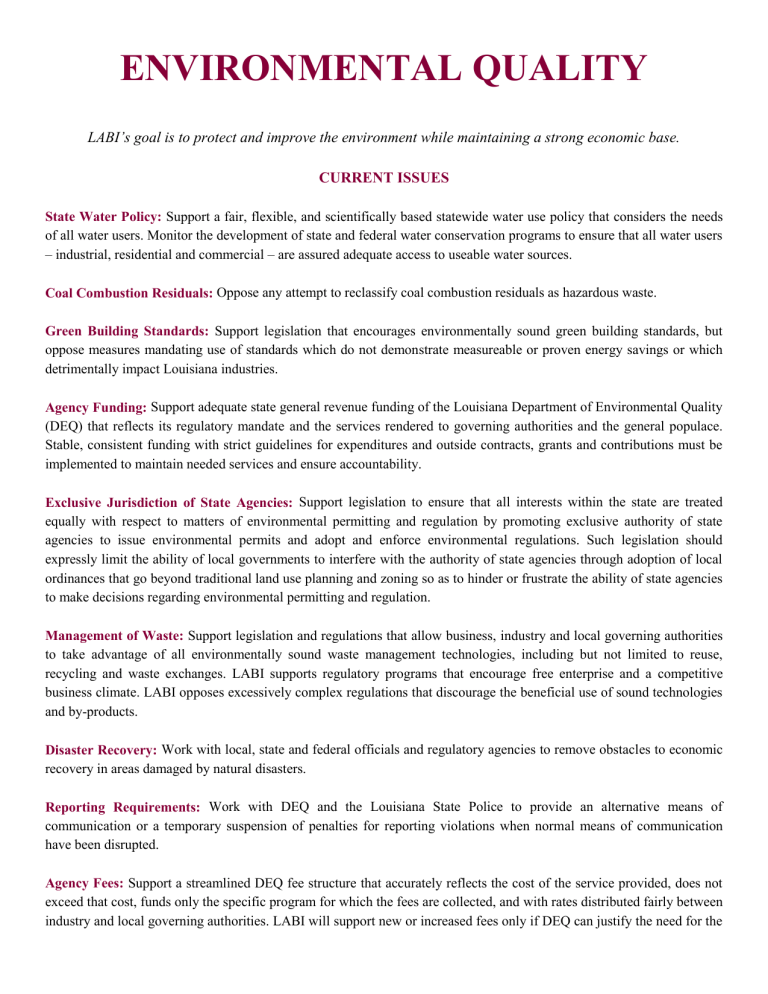
ENVIRONMENTAL QUALITY
LABI’s goal is to protect and improve the environment while maintaining a strong economic base.
CURRENT ISSUES
State Water Policy: Support a fair, flexible, and scientifically based statewide water use policy that considers the needs of all water users. Monitor the development of state and federal water conservation programs to ensure that all water users
– industrial, residential and commercial – are assured adequate access to useable water sources.
Coal Combustion Residuals: Oppose any attempt to reclassify coal combustion residuals as hazardous waste.
Green Building Standards: Support legislation that encourages environmentally sound green building standards, but oppose measures mandating use of standards which do not demonstrate measureable or proven energy savings or which detrimentally impact Louisiana industries.
Agency Funding: Support adequate state general revenue funding of the Louisiana Department of Environmental Quality
(DEQ) that reflects its regulatory mandate and the services rendered to governing authorities and the general populace.
Stable, consistent funding with strict guidelines for expenditures and outside contracts, grants and contributions must be implemented to maintain needed services and ensure accountability.
Exclusive Jurisdiction of State Agencies: Support legislation to ensure that all interests within the state are treated equally with respect to matters of environmental permitting and regulation by promoting exclusive authority of state agencies to issue environmental permits and adopt and enforce environmental regulations. Such legislation should expressly limit the ability of local governments to interfere with the authority of state agencies through adoption of local ordinances that go beyond traditional land use planning and zoning so as to hinder or frustrate the ability of state agencies to make decisions regarding environmental permitting and regulation.
Management of Waste: Support legislation and regulations that allow business, industry and local governing authorities to take advantage of all environmentally sound waste management technologies, including but not limited to reuse, recycling and waste exchanges. LABI supports regulatory programs that encourage free enterprise and a competitive business climate. LABI opposes excessively complex regulations that discourage the beneficial use of sound technologies and by-products.
Disaster Recovery: Work with local, state and federal officials and regulatory agencies to remove obstacles to economic recovery in areas damaged by natural disasters.
Reporting Requirements: Work with DEQ and the Louisiana State Police to provide an alternative means of communication or a temporary suspension of penalties for reporting violations when normal means of communication have been disrupted.
Agency Fees: Support a streamlined DEQ fee structure that accurately reflects the cost of the service provided, does not exceed that cost, funds only the specific program for which the fees are collected, and with rates distributed fairly between industry and local governing authorities. LABI will support new or increased fees only if DEQ can justify the need for the
additional revenue, assures the fees will be used only for the services for which they are intended, and provides evidence of increased efficiency measures. Work with DEQ to create a consolidated and itemized fee invoicing system.
Permits: l
Support legislation and/or regulation which minimizes uncertainty and provides clear guidance to DEQ and regulated entities relative to information, such as compliance with the “IT decision” ( Save Ourselves, Inc. v
Louisiana Environmental Control Commission, 452 So.2d 1152 (La. 1984)), which is required for issuance of permits and, upon compliance, ensures the issuance of permits. l Oppose the use of “environmental justice,” particularly efforts funded with taxpayer-funded grants, as a means of stopping or inhibiting economic development. Assure the rights of minorities are protected under the Civil Rights Act. l Streamline the permitting process. Encourage the development and use of general permits for similar groups of facilities. Encourage DEQ to eliminate the backlog of pending permits and to issue permits timely, per Act 686 of
1990. l
Support and encourage the timely granting of permits that are valid for the life of the facility, especially solid waste facilities. l Oppose measures that would jeopardize the integrity of a permit during its term.
l Encourage the state to adequately fund environmental programs and to set compensation levels and implement other modifications to attract and retain trained environmental professionals to manage DEQ and to process permit applications in a timely manner. l Encourage informal dialogue between DEQ and the regulated community about permitting and enforcement matters.
Allow permitees to review an early draft of their permit for accuracy and completeness. Encourage DEQ to accept submittal of permit applications and other information by electronic means (e-data submittal). l Oppose the banning of any permitted business activity unless and until valid, scientific studies document significant adverse impact on the environment. l
Support the expansion and continued implementation of DEQ’s regulatory permit program.
Clean Air: Support efforts to make Louisiana’s air quality programs equivalent to and no more restrictive than the 1990 amendments to the federal Clean Air Act. Support legislation and rules that equitably distribute the responsibility for meeting air quality requirements among all emission sources. Support DEQ efforts to promote federal acceptance of reasonable state air quality programs. Strongly encourage DEQ to promptly update the State Implementation Plan (SIP) to incorporate EPA’s favorable changes to federal rules, and support additional regulatory reform.
Administrative Procedures: Ensure that the division of administrative law be maintained. Further, require DEQ adherence to the Administrative Procedure Act (APA) to ensure due process, fairness and accuracy in the promulgation and implementation of regulations and policies. The APA should guide the conduct of administrative procedures relative to actions and decisions by the department.
Administration Liaison: Work closely with the administration to assure that regulatory agencies and legislative committees dealing with the environment will foster a climate conducive to economic development while protecting the environment through the use of sound science.
Coastal Zone: Continue to support efforts to conserve the coastal zone in accordance with Act 361 of 1978, particularly with regard to state jurisdiction. Support America’s Wetlands program and work to raise awareness of the economic value of Louisiana’s wetlands. Support efforts to better define the coastal zone and streamline the coastal use permit process.
Economic Development: Support fair and consistent enforcement of Louisiana environmental laws and regulations, but oppose using unrelated measures, such as environmental justice actions and/or restricting the availability of tax exemption programs, as penalties for environmental violations. Additionally, encourage state agencies to set long-term objectives so that business and industry can accomplish necessary planning vital to further economic development.
Liability:
Oppose any expansion of punitive damages, criminal penalties or “bad actor” provisions in environmental law or regulations.
Emergency Response: Support legislation to give the appropriate governmental entities principal jurisdiction over emergency response action. Support DEQ’s flexibility in assisting regulated facilities and generators to react and respond in the event of an emergency.
Landowner Rights: Oppose the regulation of any use or condemnation of private property unless based on adequately demonstrated public need. Support legislation to require the governing body to deal openly with the landowner and to adequately compensate property owners for loss of use or devaluation of their property caused by environmental regulations, laws or policy.
Rule Flexibility: Support implementation of 1997 Act 992, which authorizes regulatory flexibility in return for improved environmental performance and recognizes DEQ as the sole authority.
Consistency, Validity and Consolidation of Regulations: Encourage state and local agencies to streamline and simplify compliance with environmental programs by revising laws, regulations, standards, enforcement procedures, fees and penalties to be consistent with federal requirements. Consolidate, merge or eliminate duplicative or overlapping regulatory programs and reporting to reduce the costly regulatory burden on industry. Base regulations on valid science, rather than upon unsupportable allegations or claims. LABI supports DEQ’s efforts to coordinate federal and state environmental programs and recognizes DEQ’s primacy in federally delegated programs.
General Environmental Legislation: Support environmental legislation that balances environmental concerns with economic realities and is workable, practical, equitable and consistent.
ONGOING POLICY
State Jurisdiction: Support existing laws granting exclusive jurisdiction of the Louisiana Environmental Affairs Program and the Coastal Zone Management program at the state level. Maintain the present DEQ jurisdiction.
Public Communication: Encourage the use of sound science to explain the issues, quickly addressing inaccurate media coverage and publishing information on environmental progress. Develop and maintain ongoing proactive programs and dialogue with government, news media, regulators and the public to promote maximum understanding of environmental issues, including risk management programs, and associated risks and benefits. Encourage member companies, local chambers of commerce and other business and professional organizations, as well as governmental agencies, to further improve internal and external communication of environmental issues and progress.
Environmental Compliance Records: Support accurate facility compliance records by encouraging clear, concise differentiation by DEQ between an issued and/or pending order and a resolved and recorded legal enforcement action.
Encourage DEQ to include in the official compliance record only settled or resolved enforcement actions.
Development of Regulations: Support the continued publication by DEQ of the agency’s regulatory agenda and continued expansion of information available from and submitted to DEQ on the Internet and other electronic media.
Additionally, the full text of proposed regulations should be published in the Louisiana Register and available on the DEQ website; copies of proposed rules should be promptly available in DEQ’s regional offices; fiscal and economic impact statements should realistically reflect compliance costs to industry and local government. Oppose the development of
“unwritten policies” and “guidelines” by DEQ in lieu of properly promulgated and authorized rules.
Emergency Reporting: Support efforts to implement 1989 Act 200 requiring DEQ and the Department of Public Safety to create a statewide uniform emergency reporting and notification system. Lists of reportable chemicals and quantities must be made identical, with penalties prohibited for substances not on the DEQ list.
Hazardous Waste Tax: Oppose new or increased taxes on the generation, transportation, storage, disposal, incineration, recycling, injection or treatment of hazardous waste or any permitted emission.
Environmental Leadership: Support and encourage member participation in the Louisiana Environmental Leadership
Pollution Prevention Program.
Exclusionary Provisions: Oppose any regulatory or legislative attempt to introduce unnecessary exclusionary language that would, by inclusion or exclusion, restrict to any group or groups of environmental professionals the delivery of environmental services.
Gulf of Mexico Program/Barataria-Terrebonne National Estuary Program: Support programs that are based on scientific information and that balance environmental concerns with economic development. Encourage DEQ and LABI members to participate to the greatest extent possible and to communicate the programs’ progress with other members and the public.
Small Business: Support efforts to minimize the regulatory burden on small business, and support and participate in activities to assist small business with environmental compliance.
Interagency Consistency: Encourage an ongoing dialogue among state agencies to ensure interagency regulatory consistency and the promotion of a favorable business climate while continuing to protect and improve the environment.
Litter: Support and encourage all reasonable efforts to eliminate litter in Louisiana, including anti-litter public campaigns.
Access to Information: Support implementation of state law (Act 1063 of 1990) with regard to freedom of information to assure that it adequately serves the needs of the general public and the private sector, while protecting the confidentiality of sensitive information where appropriate. Support the implementation of Act 636 of 2004 that authorizes DEQ to restrict access to certain security sensitive information for the purpose of preventing its distribution or dissemination via the
Internet.
Right-to-Know:
Support making Louisiana’s Right-to-Know program consistent with the Superfund Amendment and
Reauthorization Act (SARA), Title III.
Oilfield Wastes: Oppose legislation that would unilaterally reclassify oilfield wastes as hazardous or any other inappropriate classification. LABI supports EPA’s current definition of hazardous wastes related to oil and gas
exploration and production activities. Encourage the development of scientifically appropriate, reasonable testing regulations that accurately demonstrate the non-hazardous nature of the majority of oilfield wastes. Evaluate and support appropriate disposal and treatment options for exploration and production wastes for facilities regulated by DEQ and
DNR.
—See also the Federal Program —
Contact: Emily Stich (225/215-6662; or EmilyS@LABI.org) Emily’s responsibilities as Vice President for Research and Programs include the yearlong task of coordinating the entire program development process that results in this document. She is also the Director of the Environmental Quality Council and a House floor lobbyist.
Emily Stich
Director, Environmental Quality Council
Vice President, Research and Programs
LABI
William Matthews
Chair, Environmental Quality Council
CLECO Corporation
FEDERAL PROGRAM
ENVIRONMENTAL QUALITY
U.S. Climate Change Policy: LABI specifically opposes any cap and trade legislation or the imposition of any carbon tax.
Toxic Substances Control Act: Support reforms to the federal Toxic Substances Control Act (TSCA) that protect the public health and the environment, and that support our nation’s ability to continue leading the world in developing the innovative new products that benefit us all while preserving the high-quality, high-paying American jobs that are created when American companies invent, manufacture and sell American products.
Emergency Resources:
Petition Louisiana’s congressional delegation to provide sufficient resources to the Louisiana
Department of Environmental Quality (DEQ) and the state to address environmental matters arising from hurricanes, natural disasters and any other state emergency.
Emergency Regulatory Flexibility:
Support and encourage DEQ’s and EPA’s flexibility in assisting regulated facilities and generators to react and respond in the event of an emergency.
Ozone Transport and Attainment: Oppose interstate ozone transport strategies that may worsen Louisiana air quality or that cannot be supported by a scientifically valid cause-and-effect relationship. Encourage the EPA to complete redesignation of all the parishes that are meeting and will continue to meet the air quality standard for ozone.
Ozone Attainment: Support modification of the Clean Air Act to allow extension of the attainment year for ozone nonattainment areas. Encourage EPA to issue guidance regarding baseline year emissions to allow credit for emission reductions, averaging of emissions from years other than the non-attainment year, and exemptions. Support the retention of the current scientifically based standard which has been accepted by EPA as being protective of human health and the environment.
Permits: Support and encourage the timely granting of permits that are valid for the life of the facility.
Global Warming Treaties: Oppose Senate ratification and presidential approval of any national or international legislative proposal or treaty on global warming, unless developing countries are included in its requirements, which must be based on valid, peer-reviewed science, and the U.S. is not disproportionately affected by mandated greenhouse gas emissions reductions or other provisions.
EPA Overfiling: Oppose EPA’s filing separate enforcement actions after an agreement has been reached between the state and a regulated entity under a federally delegated program. The regulated community should be able to achieve finality when it resolves an environmental dispute with DEQ (or any other state agency) in a program that has been
“delegated” to the state of Louisiana by the EPA. LABI will work to eliminate EPA “overfiling,” as this practice places the regulated community in a double-jeopardy type situation.
Environmental Justice: Oppose the use of “environmental justice,” particularly efforts funded with taxpayer-funded grants, as a means of stopping or inhibiting economic development. Assure the rights of minorities are protected under the
Civil Rights Act.
Rule Flexibility: Support legislation and regulations that provide for regulatory flexibility in return for improved environmental performance.
Clean Air Regulations: Support Clean Air Act implementing regulations that are reasonable, cost-effective and workable. Support efforts to prevent tightening of National Ambient Air Quality Standards (NAAQS). Support additional reforms to the New Source Review (NSR) rules by EPA. Oppose revisions of “Maximum Achievable Control
Technology” (MACT) standards which are not based on sound science and technically feasible standards.
Superfund: Support comprehensive reforms to the existing Superfund program by prioritizing and speeding up cleanup, repealing retroactive liability, setting reasonable cleanup standards based on sound science, and opposing the imposition of new taxes.
Landowner Rights: Oppose the regulation of any use or condemnation of private property unless based on adequately demonstrated public need. Support legislation to require the governing body to deal openly with the landowner and to adequately compensate property owners for loss of use or devaluation of their property caused by environmental regulations, laws or policy.
Wetlands: Support clear, consistent U.S. Army Corps of Engineers implementation of wetlands regulations. Encourage the development of regulations and policies that exempt nonviable wetlands from regulation. Support the development of mitigation banking policies and regulations that maintain economic competitiveness in an impacted watershed. Support the timely issuance of permits. Oppose efforts to amend the Clean Water Act to remove “navigable” from the definition of jurisdictional waters of the United States.
Environmental Audits/EPA: Encourage the EPA to amend its Policy on Self-Policing to make the “protections” legally binding; eliminate or reduce the number of conditions a company must meet to obtain these protections; and make the
Policy clear, meaningful and useful to businesses conducting environmental self-audits.
General Environmental Legislation: Support federal environmental legislation that balances environmental concerns with economic realities and is workable, practical, equitable and consistent.
Cost-Benefit Analysis: Support legislation that will require cost-benefit assessments to be included in the process by which rules are promulgated.
Waste Bans: Support resolution at the federal level of interstate waste shipment and disposal issues.
Oilfield Wastes: Oppose legislation that would unilaterally reclassify oilfield wastes as hazardous or any other inappropriate classification. LABI supports the EPA’s current definition of hazardous wastes related to oil and gas exploration and production activities.
Gulf of Mexico Program/Barataria-Terrebonne National Estuary Program: Support programs that are based on scientific information and that balance environmental concerns with economic development. Encourage DEQ and LABI members to participate to the greatest extent possible and to communicate the programs’ progress with other members and the public.
Contact: Emily Stich (225/215-6662; or EmilyS@LABI.org)
